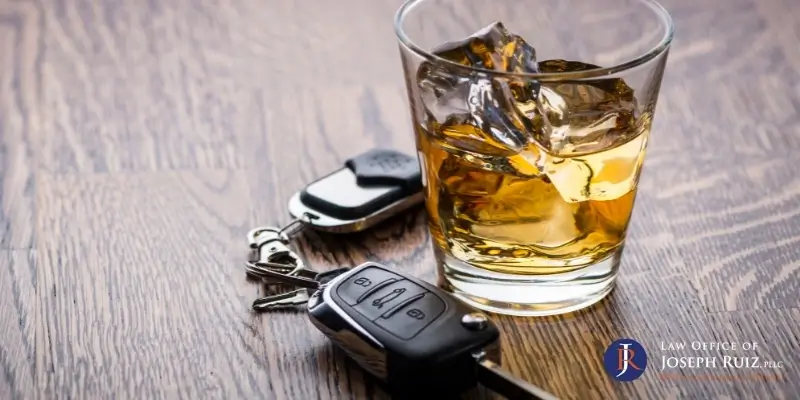Schedule a Consultation
Is Jail Time Mandatory For 1st DWI in Texas? 2025

If you were recently charged with a DUI, you may be asking yourself, “Is jail time mandatory for 1st DWI in Texas?” The good news is that while jail time is a possible penalty, it is not always mandatory.
Depending on the specifics of your case, alternatives such as probation or community service may be available. Understanding your options can help you navigate this challenging time and make informed decisions about your case. A knowledgeable DWI attorney can help you explore your options and build a strong legal defense.
Penalties for a First-time DWI in Texas
A first DWI offense is typically classified as a Class B misdemeanor, which comes with a range of penalties. These include heavy fines, a driver’s license suspension of up to one year, and jail time between a few days and several months. Probation may include alternative measures such as attending a DWI education program, completing community service, or complying with other court-imposed conditions.
Certain factors can elevate a first DWI to a Class A misdemeanor, which carries harsher penalties. If your blood alcohol concentration (BAC) was 0.15% or higher at the time of your arrest, the potential fines and jail time can increase.
If there was an accident causing serious injury or if a child was in the vehicle, the charge could be further enhanced, leading to more severe consequences. Texas’ DUI laws include language for a mandatory three days of jail time. Our legal team can help you explore whether this can be suspended by a judge.
Can Probation Replace Jail Time for a First DWI?
Probation, also referred to as community supervision, is a frequently used alternative to mandatory jail time for first-time offenders. Probation serves multiple purposes in the criminal justice system.
It allows qualifying non-violent offenders the opportunity to continue working and contributing to society while still facing a form of punishment for the crime they committed. Probation also keeps jails from becoming overcrowded. This reduces the financial burden on the state associated with confining and feeding jailed individuals.
When probation is granted, the mandatory three-day jail term and other incarceration penalties are suspended, provided the offender meets specific court-ordered conditions. These conditions often include abstaining from alcohol, completing a DWI education program, performing community service, and attending regular check-ins with a probation officer.
Length of Probation
The length and terms of probation vary but are designed to hold offenders accountable while avoiding the harsher consequences of jail time. Whether probation is granted is at the discretion of the court and is largely dependent on the circumstances of the arrest.
Factors to Consider
Factors that a judge may consider include blood alcohol concentration (BAC) levels and the presence of aggravating factors, as well as the offender’s criminal history. For example, an individual with no prior offense record and no aggravating circumstances may be more likely to receive probation.
However, aggravating factors like a BAC of 0.15% or higher or involvement in an accident may complicate eligibility. Failing to comply with the terms of probation can lead to serious consequences, including revocation and potential jail time.
Missing required check-ins, failing to complete a DWI education program, or violating other conditions may result in stricter penalties or additional legal challenges. Courts view adherence to probation as a measure of accountability, so meeting all requirements is crucial to avoiding further complications.
FAQs
Can You Avoid Jail Time for a First DWI in Texas?
Avoiding jail time for a first DWI in Texas is possible, depending on the circumstances of the case. Alternatives like probation, community service, or mandatory alcohol education programs may be offered instead of jail. Hiring an experienced attorney can improve your chances of minimizing penalties, as courts often consider leniency for first-time offenders who demonstrate accountability.
What Is the Minimum Sentence for a DWI in Texas?
The minimum sentence for a first-time DWI in Texas typically includes a fine, community service, and a driver’s license suspension. Jail time of up to 72 hours is often required, though alternatives like probation may be available. Sentences can vary based on factors like blood alcohol concentration (BAC) and whether there were aggravating circumstances such as accidents or injuries.
What Happens at the First Court Date for a DWI in Texas?
The first court date for a DWI in Texas, known as an arraignment, involves entering a plea of guilty, not guilty, or no contest. The judge will explain the charges and discuss your rights. If you plead not guilty, the case will proceed to pretrial hearings. It’s important to have legal representation to evaluate options and protect your interests.
What Is the New DWI Law in Texas?
Recent changes to DWI laws in Texas focus on stricter penalties for repeat offenses and intoxication-related injuries. Ignition interlock devices are increasingly required for first-time offenders seeking license reinstatement. Some counties also emphasize diversion programs aimed at rehabilitation. Staying updated on legislative changes ensures compliance with evolving DWI enforcement policies across the state.
What Is an Aggravated DWI in Texas?
An aggravated DWI in Texas involves factors that elevate the severity of the offense, such as a blood alcohol concentration (BAC) of 0.15% or higher, having a child passenger, or causing an accident resulting in a serious injury. These circumstances can lead to enhanced charges and penalties, including higher fines, longer license suspensions, and extended jail time.
Don’t Wait. Schedule Your DWI Consultation Today
The prospect of facing time in jail can be distressing. Even a few days in Texas’ jail system can be a traumatic experience that is worth avoiding when possible. At the Law Office of Joseph Ruiz, PLLC, our legal team understands the importance of keeping our clients out of jail.
Our first priority is to have your charges reduced or dropped. We can work toward this goal by scrutinizing the evidence used against you. Jail alternatives are another option we can pursue. Texas law allows eligible offenders to avoid jail time if probation is granted. To learn more about how our law firm can help you avoid serious penalties, contact our office today to schedule your free consultation.




